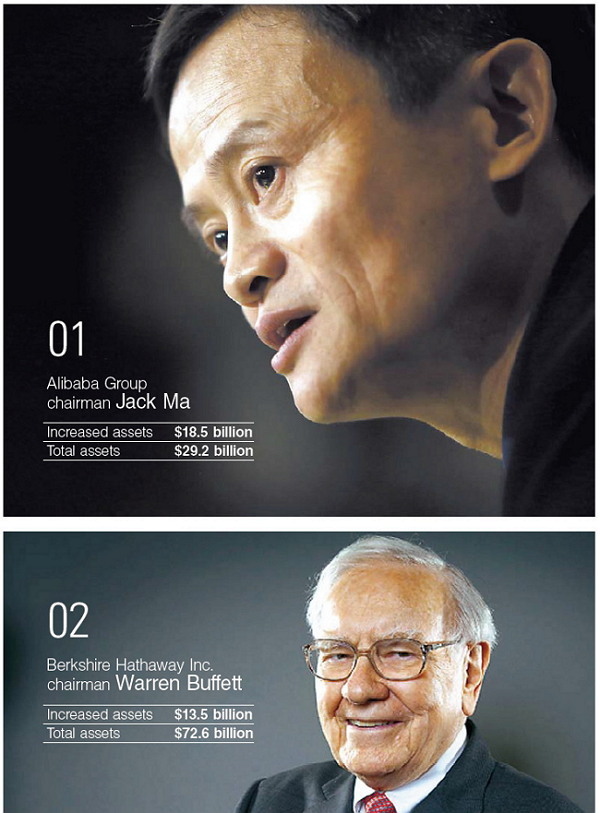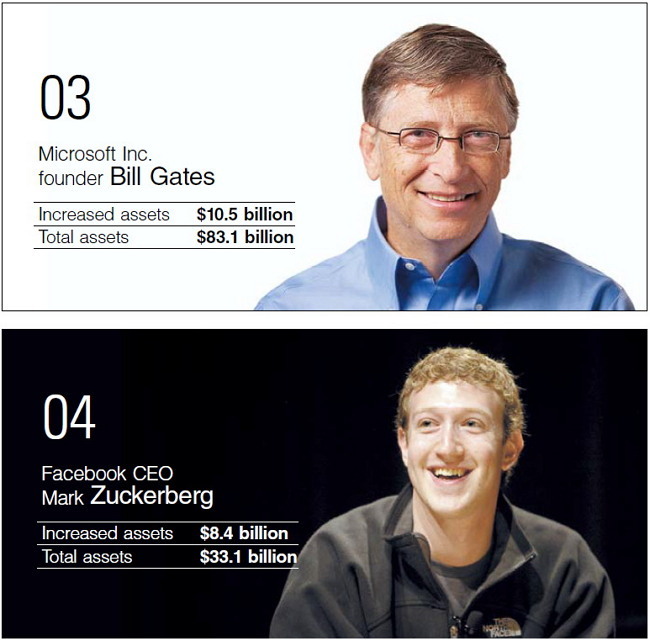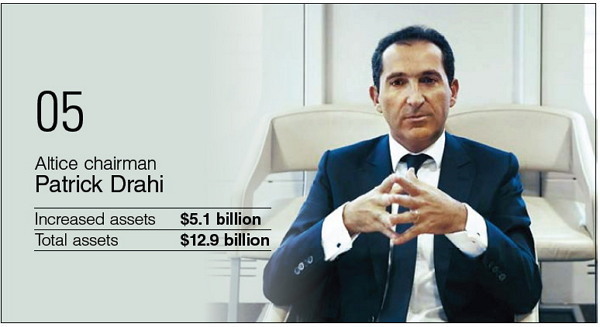The year 2014 has been quite an eventful one for the superrich.
Their assets and rankings have changed considerably, while new billionaires have emerged and others have forfeited their entire fortunes overnight.
As the status of the superrich is primarily decided by assets, numbers are the best way to gauge their achievements.
To the superrich ― who in many ways control their country’s economy ― these numbers mean more than wealth. They are a reflection of their business philosophy and strategy.
These numbers can also be a yardstick for evaluating whether they made the right decisions along the way.
Given all this, the person who earned the most this year was Alibaba Group chairman Jack Ma, according to data collected by Wealth X, a Swiss asset information provider based in Singapore.
Jack Ma, top superrich in 2014
In the world of billionaires, Chinese e-commerce giant Alibaba Group has an especially high profile.
The group is headed by Jack Ma, once a poor English teacher and now the richest man in China. Ma grabbed the world’s attention when he flashed his signature childlike smile at this company’s initial public offering earlier this year.

His total assets stood at $29.2 billion including the $18.5 billion he made this year alone, which marks an annual increase of 173 percent.
Considering that Korea’s top superrich Samsung Electronics chairman Lee Kun-hee holds $12.6 billion in assets, Ma’s annual income was equivalent to Lee’s lifetime earnings.
So how did a mere English teacher become a billionaire?
Just two decades ago, Ma’s monthly salary was about 89 yuan ($14). Born into an average Chinese family, Ma neglected his studies and barely made it into college. He was also not much of a looker ― at least according to Ma, who said this was why he had struggled to find a job.
While working as an English teacher, a business trip to the U.S. in 1995 completely changed his life. This was when he encountered the Internet. In 1999, he established Alibaba.
About 15 years later, Ma has turned that small venture company into the largest e-commerce company in China.
When the company was listed on the New York Stock Exchange in September, Ma opened the market with a smile and a thumbs-up.
The stock opened at $92.70 on the first day of trading and closed at $93.89 ― 38.1 percent higher than the initial offering of $68. Alibaba’s stock market debut broke a world record with $25 billion to make Ma the richest man in China.
He now holds 6.36 percent of Alibaba shares, worth some $16.3 billion.
Ma is followed by Berkshire Hathaway chairman Warren Buffett, Microsoft founder Bill Gates, Facebook CEO Mark Zuckerberg and Altice chairman Patrick Drahi.


Korean tycoons who made headlines
Here in Korea, a number of billionaires also made the headlines.
As it appears that Samsung Electronics chairman Lee Kun-hee won’t be getting up anytime soon after suffering a heart attack in May, his eldest son Lee Jay-yong has been garnering intense media attention this year as the company’s successor.
Although the junior Lee has not been out in public too often, he has proactively stepped up to manage the company business on behalf of his father whenever possible, meeting international business tycoons such as Microsoft CEO Satya Nadella and Facebook CEO Mark Zuckerberg at various events.
His asset ranking has changed as well. Thanks to the successful IPOs of both Samsung SDS and Cheil Industries ― in which he holds 11.25 percent and 23.24 percent shares, respectively ― his assets rose to $7.1 billion, making him one of the world’s top 200 billionaires.
Korean Air heiress Heather Cho also gained international attention, but not in a positive way.
After news reports surfaced that she had boarded a flight drunk and yelled at crew members over how nuts were served in the first class cabin, the dirty laundry of both Cho and her family began to be aired publicly.
This has worsened the lingering antichaebol sentiment in Korea.
Meanwhile, at Lotte, the group chairman Shin Kyuk-ho, 93, became the oldest business tycoon in Korea. In the first half of this year, he entered the beer market ― something he had been trying to do since 1999 ― with a brand called Kloud.
He also opened parts of the Lotte World Tower, Seoul’s newest landmark, despite the mounting safety concerns.
Both Kloud and the tower were two of the chairman’s oldest business goals. The man may be aged, but he has the initiative and drive of a young businessman, industry watchers say.
The fact that his name appears more often in the media than that of his son Dong-bin shows that he has higher name value.
The only shadow cast over this success is the problems that Lotte World Tower has been enmeshed in, mainly regarding safety.
Given how turbulent this year has been, we can only guess what changes the billionaires will go through in 2015, and the years beyond.
By Korea Herald Investigative Report Team
(hjlee0301@heraldcorp.com)
Kwon Nam-keun
Hong Seung-wan
Sung Yeon-jin
Bae Ji-sook
Yoon Hyun-jong
Min Sang-seek
Kim Hyun-il
Lee Hee-ju

